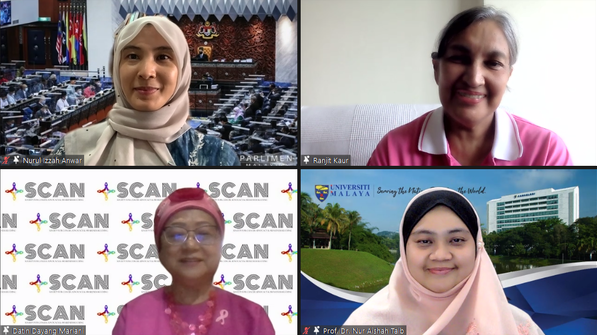KUALA LUMPUR, Oct 29 — Cancer treatment in Malaysia can improve by having more specialist nurses and a better network of hospitals in rural areas, especially in Sarawak and Sabah, that could boost access and efficiency in cancer care.
Breast Cancer Welfare Association president Ranjit Kaur said many nurses are not able to specialise in specific areas as they advance in their careers, which curb the overall development of knowledge and nursing skills in cancer care.
“What we tend to face in Malaysia is that nurses are often trained, and some of them are trained in a special area like let’s say, in breast cancer, and then what happens is that this nurse gets promoted. She loses all that skills and knowledge that cannot be replicated because she is in a totally different department.
“So, I’m going to start with nurses. Nurses need a ladder, they need to be going up the ladder in that particular speciality. Let’s say if it is a speciality of a particular cancer, she should grow into that, do her masters, do her PhD, as she’s working so that she grows in that area so that you can have a cadre of nurses who are handling that area and let me tell you, nurses are very good in communication. Their communication skills with patients are much better,” Ranjit said.
She said this during a special panel session on surviving cancer chaired by Permatang Pauh MP Nurul Izzah Anwar at Galen Centre for Health and Social Policy’s “Improving Access To Cancer Treatment And Care” virtual conference recently.
Apart from training specialist nurses, Ranjit said informal manpower can be acquired by training cancer survivors to support patients.
“They can support patients, they can navigate patients, not just with their experience along but they need to be trained, certified, and supervised. You cannot let them run free because they may have other ideas,” she said, adding also the need for psycho-oncologists for when doctors break the bad news to patients.
“Doctors can send a patient there (to a psycho-oncologist in the next room) to vent out their feelings and express their concerns, their fears and their uncertainty,” said Ranjit, who is also a breast cancer survivor.
“I thought I was going to die. I asked the doctor ‘do I have a week, a month, or a year?’ because I knew nothing at that time, and most people come in knowing nothing. You are going into a new world of cancer, you need to learn new words.
“The doctor told me ‘mastectomy’ which I didn’t understand at all. All those things, a nurse could do with the patient. If nurses can be caseworkers who work with a group of patients, we will be so enriched,” she said.
Meanwhile, Society for Cancer Awareness and Advocacy Kuching (SCAN) advisor Dayang Mariani Abang Zain said logistics remain the primary issue for cancer patients seeking treatment in Sarawak.
“For example, I was on a plane from Sibu to Kuching, and I met a lady who was sitting next to me and her eyes were bulging. I asked where she was going and she said she was going to see her doctor and that she was diagnosed with eye cancer.
“She told me she had to travel days earlier to get from her longhouse to Kanowit, and then from Kanowit to Sibu the next day, and it takes another flight to come to Kuching. So, that is why a lot of cancer is late presentation because of the locality of all these people in Sarawak,” she said.
“It makes it even harder, like I said, Kuching is the only place that has all the facilities, and radiotherapy, for example, is only in Kuching. So, you can imagine, if you have 33 cycles of radiotherapy, you have to live in Kuching, if you are from Limbang or Lawas.
“Sometimes, we do have places for them to say but for them, you take them a month away from home, they can lose their income. They cannot come alone, it has to be two persons, so it becomes very difficult,” said Dayang Mariani, who also survived cancer.
She hopes that another radiotherapy centre can be set up in the northern city of Miri, in addition to the single centre currently available in Kuching.
“If you have one radiotherapy centre there, at least those in the northern region do not have to come down to Kuching for radiotherapy and that lessens the burden of logistics,” she said.








